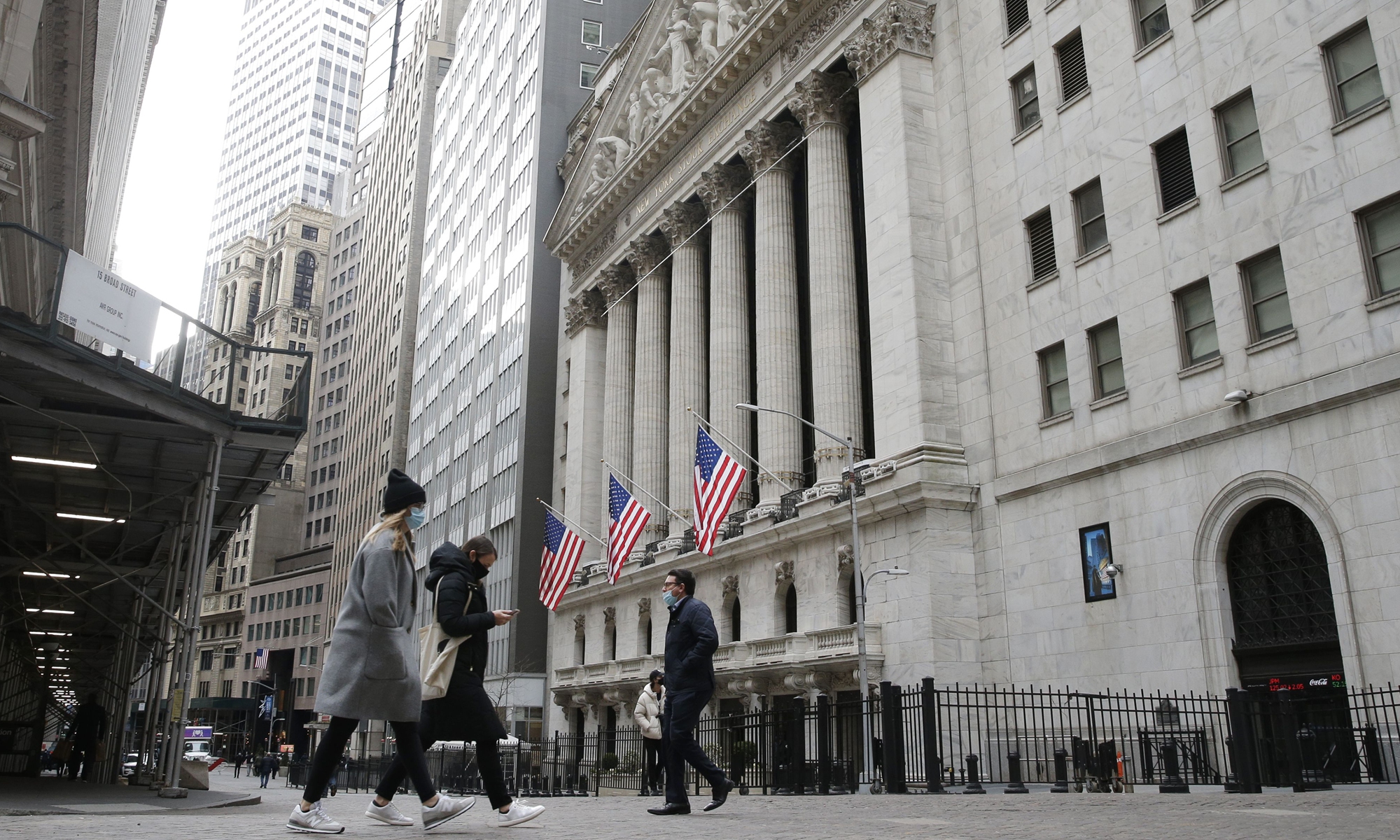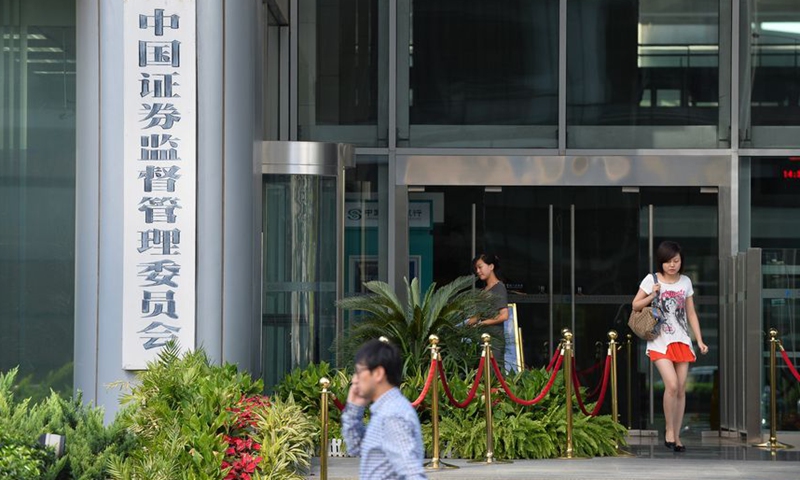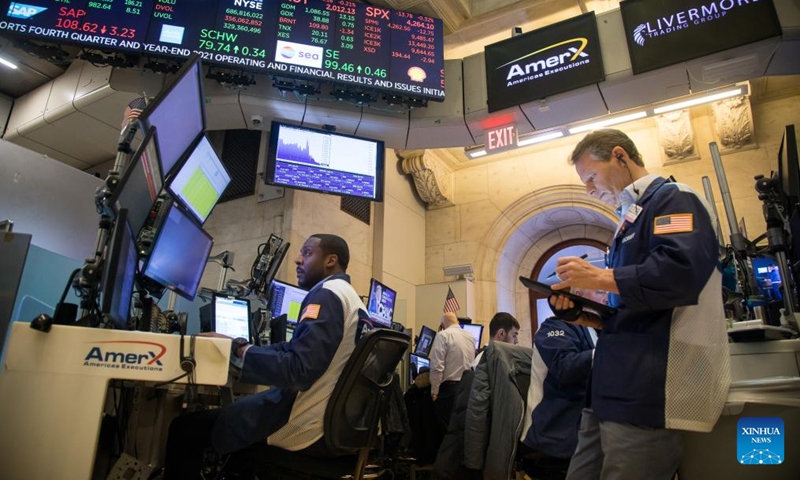US ups delisting threat on Chinese stocks, disregards free market to contain China

The New York Stock Exchange Photo: IC
The provisional list, widely circulated late Thursday and prompting China's securities regulator to voice opposition against politicizing securities regulation in a late-night statement, speaks volumes about how the US market has increasingly degraded into a political tool for the Biden administration to suppress Chinese-funded companies, said industry observers.
With the delisting threats possibly engulfing almost all Chinese firms traded on US exchanges, calls for a homecoming have grown stronger, even though a secondary listing in the Hong Kong market, most preferred as a way out of the plight, might not necessarily be a near-term option, according to insiders.
It seems that a settlement of the seemingly uncompromising issue through regulatory cooperation across the Pacific is still in the works.
While global markets have been on a rollercoaster ride over the past few weeks amid woes over inflation and the Ukraine crisis, a rout across US-listed Chinese firms still caught global investors off-guard.
Stocks of the US-traded Chinese firms generally fell sharply on Thursday, with the NASDAQ Golden Dragon China Index closing down 10 percent, its biggest one-day drop since October 2008, as five Chinese stocks were found to be on a US provisional list of foreign companies that may be delisted if they fail to file accounting reports in line with a tougher US regulatory push against China.
The delisting threat also sent the shares of four firms, except ACM Research which is not traded in Hong Kong, as well as dual-listed Chinese firms, into a nosedive in the Hong Kong capital market on Friday. The Hang Seng Tech Index once dropped by more than 8 percent, its largest slump in history, and it closed 4.28 percent lower.
The US Securities and Exchange Commission (SEC) prepared the provisional list, published on its official website, singling out five Chinese firms - BeiGene, Yum China Holdings, Zai Lab Limited, ACM Research, and HUTCHMED (China) Limited - that would have to submit evidence disputing identification under the Holding Foreign Companies Accountable Act (HFCAA) by March 29.
The companies will have 15 business days to contact commission staff at the SEC if they believe they have been incorrectly identified and should include evidentiary support with their correspondence, the SEC said.
The companies making the provisional list dealt with the heaviest blow in performance. Among them, BeiGene fell 15.20 percent, Yum China Holdings was down 10.76 percent, and Zai Lab dropped 21.45 percent as of Thursday.

File photo shows the entrance of the China Securities Regulatory Commission (CSRC) in Beijing, capital of China. Photo:Xinhua
Shortly after midnight Friday, the China Securities Regulatory Commission (CSRC) posted a rare late-night statement on its WeChat account, saying that it has taken note of the issue, referring to the "pre-delisting list."
"We respect overseas regulators' efforts to strengthen supervision over accounting firms to improve the quality of the financial information of listed companies, but firmly oppose the wrong practice of some forces politicizing securities regulation," the CSRC said.
In March 2021, the SEC announced it would begin to implement the HFCAA to tighten oversight of US-listed foreign companies. Under the HFCAA, widely considered to target US-traded Chinese firms, a failure to submit audit working papers for three years in a row could trigger a delisting. This, nonetheless, contradicts the sharper focus China has put on data security, notably cross-border data flows, analysts said, arguing against such an intimidating move from the US.
Dong Shaopeng, an expert advisor for the CSRC, told the Global Times on Friday that it shows that the US is expanding the target of their suppression of Chinese stocks, from technology stocks to stocks with general themes, which is a strategy to obstruct the Chinese economy.
"This suppression trend is getting stronger and stronger, and this delisting trend will appear sooner or later," Dong Shaopeng said, noting that the delisting tide of Chinese concept stocks did not appear before, probably because companies were more or less waiting to see how things will develop.
"All Chinese companies listed in the US now have the risk of being delisted. But doing so will do great harm to American investors as well," the expert said.
Zai Lab expects that as companies submit their annual reports, more companies may be added to the SEC in the future, according to media reports on Friday.
The provisional list hit the US market on Thursday and sent shockwaves through US-traded Chinese firms as a whole, with shares of Alibaba, Pinduoduo, Baidu and JD.com taking a battering.
Companies on the provisional list swiftly responded with some caution.
In response to SEC's decision, BeiGene said in its statement sent to the Global Times on Friday morning that as a global biotech company, the company has been actively seeking solutions to meet the requirements of the HFCAA and looks forward to maintaining the company's presence on the NASDAQ and Hong Kong markets.
BeiGene was listed on the Science and Technology Innovation Board of the Shanghai Stock Exchange. Since the introduction of HFCAA in December 2020, the company has been taking steps to evaluate, design and promote additional business processes in order to meet the requirements of relevant parties in advance, and the relevant work is currently in progress, BeiGene noted.
Yum China Holdings said in its statement to the Global Times that under the current terms of the Act, the company's common stock will be delisted from the New York Stock Exchange in early 2024, unless the Act is amended to exclude the company or the US Public Company Accounting Oversight Board is able to conduct a full inspection of the company's auditor during the required timeframe.

Traders work on the floor of the New York Stock Exchange (NYSE) in New York, the United States, on March 10, 2022.Photo:Xinhua
Homecoming trend
An executive of a medium-sized Chinese firm listed in the US told the Global Times on Friday that the firm will adopt a defensive approach and wait-and-see attitude, observing how big firms listed in the US respond.
"We might choose to issue additional shares and recall shares to wait for [a more proper time] to come back as it is not a proper time to mull a second listing in Hong Kong considering market fluctuations," the executive said on condition of anonymity. He stressed that although not all Chinese firms will move back, homecoming is an irresistible trend.
If the US continues to implement this type of financial hegemony, arbitrarily suppressing US-listed Chinese stocks, it will be an inevitable result that Chinese companies will start to leave the US market and there are many options for them, analysts said.
The HFCAA is an excuse to suppress Chinese-funded companies, and I think it would be wise for all Chinese companies to consider delisting from the US stock market at the earliest opportunity, Dong Dengxin, director of the Finance and Securities Institute at the Wuhan University of Science and Technology, told the Global Times on Friday.
While the US government has politicized their stock market by deviating from the free market which they always boasted about, the degree of internationalization and liberalization of the Hong Kong stock market has surpassed that of the US stock market, and it still maintains its independence without politicization, he said.
"For Chinese companies, the Hong Kong market is a complete substitute for the US stock market," he said.
The homecoming of US-listed Chinese firms has been all the rage in recent years, with a rising number of Chinese companies, including Alibaba, Baidu and JD.com, among other major homegrown technology players, having opted for a secondary listing in the Hong Kong market.
Still, the door to resolving the issue through dialogue remains open.
In its late-night post, the CSRC said it is committed to the spirit of openness and cooperation and is ready to resolve the issue of inspection and investigation of relevant firms by US regulators through regulatory cooperation.
"We believe that through joint efforts, the two sides will work out cooperation arrangements that meet the legal and regulatory requirements of both countries as soon as possible, while jointly protecting the legitimate rights and interests of global investors and promoting the sound and stable development of the two markets," the regulator said.
In his remarks during the annual press conference at the conclusion of the annual legislative session on Friday, Premier Li Keqiang also said that with the door between China and the US being opened 50 years ago, it should not be shut again or pushed toward decoupling, and cooperation between the two countries carries significance for both and the wider world.
Competition between the two economies in economic and trade areas should be "benign and fair," the premier said.


